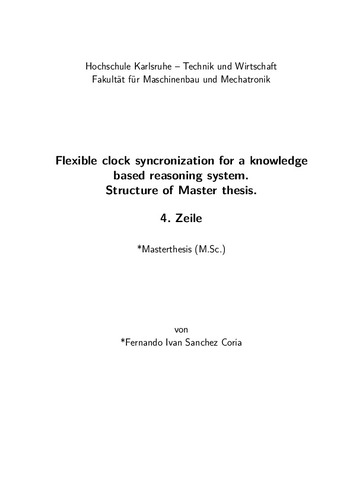Flexible clock synchronization for a knowledge based reasonig system
Other title:
Structure of Master thesis
Knowledge based reasoning systems
Author:
Director:
Subject:
Clock synchronization
Knowledge based reasoning systems
Publication date:
Editorial:
Fernado Iván Sánchez Coria
Serie:
Máster Universitario Erasmus Mundus en Mecatrónica y Sistemas Micromecatrónicos
Descripción física:
Abstract:
A fundamental criterion in the design of a robust distributed system is to provide the capability of tolerating and potentially recovering from failures that are not predictable. (failures require incorporating tolerances to various faults). The patented protocols ensure that all nodes reach the same decisions regardless of faulty components. The systems do not rely on any assumptions about the initial state of the system and do not require a central clock or externally generated pulse. The protocol, or algorithm, allows for self-stabilization of nodes within a distributed system.
A fundamental criterion in the design of a robust distributed system is to provide the capability of tolerating and potentially recovering from failures that are not predictable. (failures require incorporating tolerances to various faults). The patented protocols ensure that all nodes reach the same decisions regardless of faulty components. The systems do not rely on any assumptions about the initial state of the system and do not require a central clock or externally generated pulse. The protocol, or algorithm, allows for self-stabilization of nodes within a distributed system.
Description:
Clock synchronized Embedded systems are known as devices implemented in Mechatronic projects where two or more devices reach the same state of time in an approximate amount of time, they share information and they are capable of react in parallel.
Patrocinado por:
Hochschule Karlsruhe technik und Wirtshaft
Collections
- Trabajos Fin de Máster [5253]
Files in this item




